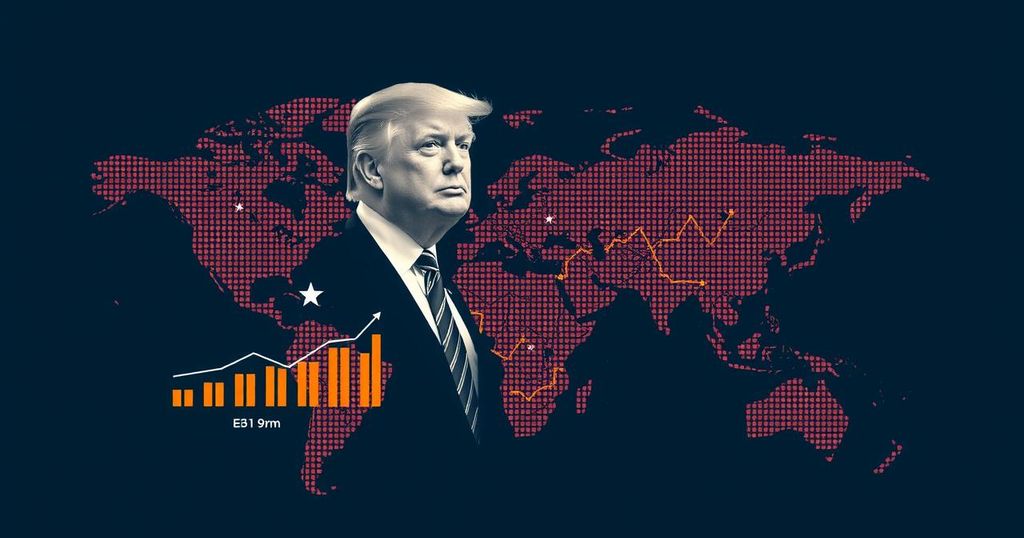The Implications of a Trump Presidency for the Global Economy
The potential return of Donald Trump as President raises significant concerns for the global economy, emphasizing protectionism and technological nationalism. His policies could exacerbate existing economic tensions and complicate international relations, particularly with China and Europe. The Trump administration represents both challenges and opportunities, necessitating a re-evaluation of global cooperation in trade, technology, and sustainability amidst rising geopolitical conflicts.
The anticipated return of Donald Trump as President in 2024 carries significant implications for the global economy, particularly through the lens of his previous policies that favored protectionism and technological nationalism. His willingness to impose tariffs on imports reflects a broader trend of America prioritizing its interests over global partnerships. The longstanding relationship between U.S. domestic policies and international economic dynamics suggests that Trump’s presidency could exacerbate economic divisions both at home and abroad. Historically, the Trump administration’s ‘America First’ doctrine has resonated across political lines, following a path established in part by former President Obama’s emphasis on energy independence and technological supremacy. During Trump’s first term, his administration accepted higher prices for consumers in exchange for protecting American industry through substantial tariffs, causing consumers to face increased costs for many goods. For example, his 2018 tariffs raised the price of washing machines by 12%. In a continuation of this protectionist stance, President Joe Biden has maintained some of the elevated tariffs while also initiating a competitive subsidy race aimed at revitalizing American manufacturing. This is exemplified by the Inflation Reduction Act, which allocates $369 billion towards the development of renewable energy technologies, thereby reshaping the energy landscape while simultaneously straining global relations. The global repercussions of America’s inward-facing policies are evident, particularly for China, which now grapples with industrial overcapacity amid its own attempts to pivot towards domestic consumption. Europe, despite budgetary constraints, is countering by increasing subsidies to retain its competitive edge, such as Germany’s investment in battery production with Northvolt. This ongoing competition to secure technological and industrial dominance results in a less cohesive global economy, knocking at the doors of urgent needs like sustainable energy development in regions such as Africa. Meanwhile, China has emerged as a leading investor in Africa, displaying a shift in global investment flows. The incoming Trump administration presents a dual opportunity: to rectify previous foreign policy missteps and to address burgeoning global crises such as energy dependence and geopolitical tensions exacerbated by the war in Ukraine. Europe must negotiate a resolution to its tariff disputes with China, which would allow for enhanced energy independence and collaborative efforts to mitigate overcapacity challenges. Ultimately, if the U.S. continues down a path of isolationism under Trump, the international community will need to adopt a more cooperative approach to navigate shared challenges. As the world faces increasing instability evidenced by rising conflicts and humanitarian crises, the need for collaborative frameworks for trade, technology, and sustainability becomes indispensable. In this reality, nations must cultivate interdependence that empowers rather than diminishes the collective global economy.
The discussion surrounding the potential re-election of Donald Trump in 2024 highlights significant concerns regarding the implications for the global economy. Notably, his previous governing style and policies have demonstrated a preference for protectionism, characterized by the imposition of tariffs and a focus on American manufacturing. This inward-looking stance aligns with longstanding bipartisan trends in U.S. economic policy, creating ripple effects across international markets and impacting relationships with key trading partners, such as China and Europe.
As the prospect of a Trump presidency looms, the path forward for the global economy remains uncertain. His previous focus on protectionist measures and technological dominance signals a continuation of policies that prioritize American interests at the expense of global collaboration. While the United States may retreat into isolationism, it is crucial for other nations to forge partnerships and create innovative frameworks to address shared challenges, particularly in sustainability and conflict resolution. The world stands at a crucial juncture, necessitating a collective effort to foster resilience against economic fragmentation.
Original Source: theconversation.com




Post Comment